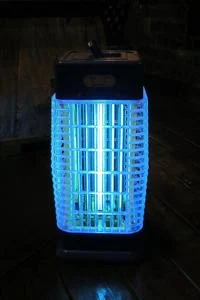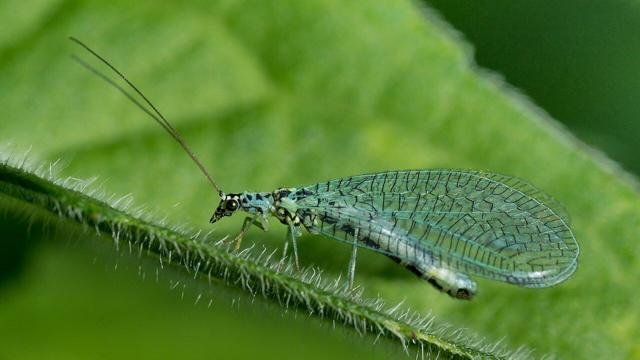Master Gardeners In the Garden
-
Lights out for insects: Understanding the impact of bug zappers
By Julie Banken
WSU Chelan/Douglas County Master Gardener
The buzz on controlling mosquitoes is to prevent their larvae from hatching. Make sure you eliminate any places where standing water — the mosquito breeding ground — can collect on your property. – Pixabay/ekamelev 
Close up of mosquito. 
Adult lacewings are nocturnal hunters of soft-bodied arthropods and are often seen fluttering by lights on a warm summer night. Many end up as victims of UV light traps. – Wikimedia Commons/Mathias Krumbholz 
Julie Banken – WSU Master Gardener intern – Provided photo/WSU Master Gardeners There is probably no sound more unwelcome in summertime than the high-pitched whine of a mosquito. This is especially true when there is work to be done in the garden.
In the quest for a mosquito-free yard, it is tempting to turn to UV light traps, or “bug zappers,” for a solution. Unfortunately, research has overwhelmingly shown that while extremely good at killing insects, bug zappers are useless at controlling mosquitoes.
Bug zappers use UV light to indiscriminately attract insects to charged metal grids, where they are electrocuted with a zap. In one study conducted in the 1990s, six typical residential bug zappers were set up and monitored during a 10-week period.
Entomologists collected, counted and identified the dead insects and found dramatic results: of 13,789 insects killed, only 31 of them were mosquitoes or close relatives. Surprisingly, in spite of these findings, bug zappers are still around, and so are mosquitoes.
How to prevent mosquitoes
Mosquitoes need standing water to breed, and even tiny pools can sustain them. It is much easier to prevent their larvae from hatching than to get rid of them once the adults have emerged.
Even before you see mosquitoes in springtime, regularly empty any containers where water can collect, such as bird baths, dog dishes, flowerpots and empty buckets. Also, clear gutters so they drain and keep water from standing too long on top of pool covers.As many campers can verify, mosquitoes are quite happy in the dark and are indifferent to artificial lights, ultraviolet or otherwise. Instead, they are lured by the smell of sweat and the carbon dioxide exhaled by their hosts. Check your porch light on a warm night for proof. Many insects will be gathered there, but mosquitoes will only show up when you do.
Although mosquitoes are not attracted to a bug zapper’s light, other insects seem inexplicably drawn to it. Bug zappers take advantage of this. Most nocturnal and crepuscular insects naturally orient themselves so that the dim light of the night sky stays at their backs as they fly through the dark. In the presence of artificial light, they reflexively turn to keep their dorsal side towards the source as they try to figure out which way is up.
Technically, it is not quite right to say that light attracts insects. It is more accurate to say they are confused and ultimately trapped by it.
It’s worth asking why bug zappers are still in use if they don’t kill mosquitoes. This review from a satisfied customer may offer some insight: “I love this light. It kills tons of every kind of bug!” This sentiment undoubtedly resonates; to many, the popping sound of insects getting zapped at night is the satisfying sound of revenge. Thanks to the reputation mosquitoes give insects in general, it is easy to understand why many people feel the only good bug is a dead one.
While it may be hard to accept when a mosquito is buzzing near your ear, fewer than 2% of all insects are pests to people. It is not hyperbole to say that the rest are essential to life on Earth. Insects (including mosquitoes) are bird food, fish food, frog food, reptile food and mammal food, not to mention food for their fellow arthropods. They are decomposers, important predators and pollinators, and without them, the ecosystem would come undone.
Bug zappers are exacting a serious toll on the insect populations that sustain us. According to one estimate, 2 million are sold each year. The number of insects inadvertently lost to UV light traps tallies in the billions. Give insects a safe haven by having a bug zapper-free yard.
It’s important to note that artificial light of any kind disrupts the normal behavior of night-flying insects, hindering their ability to forage for food, mate and reproduce. Consider limiting outdoor lighting around your garden in the summertime, or switch over to lights that are motion-activated and will only be on when you need them. Even closing curtains can help give nocturnal insects a chance to navigate by starlight once more.
A WSU Chelan and Douglas County Master Gardener column appears weekly in The Wenatchee World. To learn more, visit bit.ly/MGchelandouglas or call (509) 667-6540.
— Julie Banken, WSU Master Gardeners
previous articles
More Garden Advice
View archives
